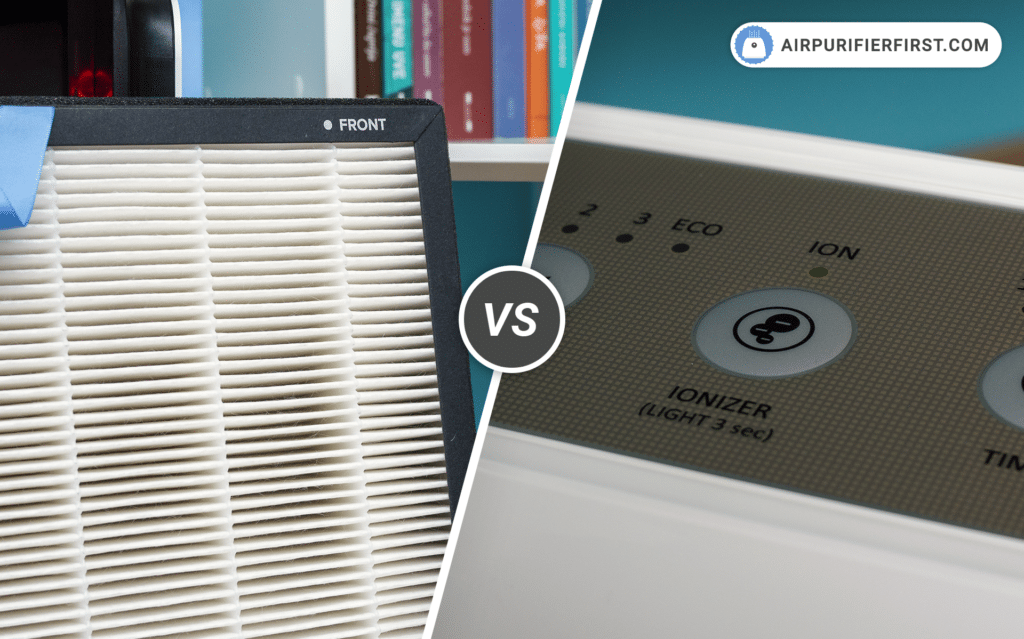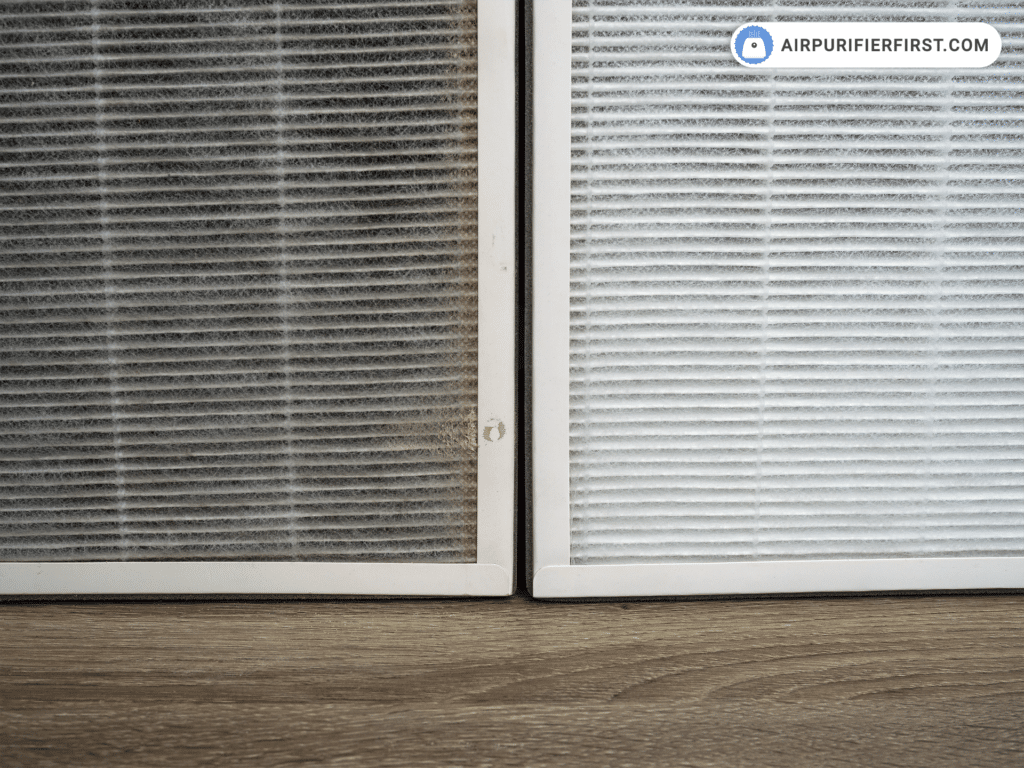The air purifier market has expanded with the introduction of many innovative filtration technologies developed to improve air quality. HEPA filters are the most common, but many air purifiers also include built-in ionizers.

Table of Contents
HEPA air purifiers are mechanical devices that capture airborne particles using fibrous and sorbent media filters (HEPA). These filters vary in efficiency, but the most common type found in air purifiers is True HEPA, others are HEPA-type, HEPA-like, HEPAGrade, and similar.
In contrast, ionizers are fundamentally different; they emit electrostatic discharges that react with airborne particles, causing them to fall onto surfaces. Often, ionizers are included as an additional filtration stage in air purifiers that already use other layers such as HEPA or activated carbon, but also there are standalone ionization devices.
Simply put, ionizers change the states of particles, whereas HEPA air purifiers clean the air by capturing airborne particles. It’s also important to note that ionizers can produce ozone as a byproduct, which is something you must be aware of as it can potentially harm your health.
How Do HEPA Air Purifiers Work?
An air purifier is a device that captures airborne particles, neutralizes bad odors, and generally improves indoor air quality.
Almost every air purifier includes a HEPA filter as part of its filtration system. The main purpose of this filter is to capture airborne particles, including dust, pollen, allergens, and hair. These air purifiers use a fan to pass the air through the HEPA filter, which then captures bad particles.

The most common type of HEPA filter in home air purifiers is the True HEPA filter. This filter can capture 99.97% of airborne particles as small as 0.3 microns in size. To be classified as a True HEPA filter, it must pass standardized testing that confirms its efficiency. These tests are performed under strict guidelines set by organizations such as the US Department of Energy (DOE).
In summary, HEPA filters don’t kill particles but capture and trap them. Unlike ionizers, which change the state of airborne particles, HEPA filters physically trap them within the filter media. Therefore, HEPA filters have a limited lifespan and need to be replaced from time to time.
How Do Air Ionizers Work?
An ionizer is a small device that uses high voltage to electrically charge airborne particles, causing them to adhere to walls, furniture, floors, and other surfaces in your home.
This small device is often integrated into air purifiers, though it can also be found as a standalone unit, such as the Clarifion Air Ionizer, which I reviewed some time ago. I recommend reading the review and tests to understand how an ionizer functions.
Ionizers can attach to small particles but may be useless for large dust particles, pollen, and house dust allergens. In my performance tests on several ionization devices, I found that they are generally less effective than traditional HEPA filter air purifiers. Moreover, ionizers don’t capture airborne particles; they only change particle states.
Ionizers work without a fan, they just simply release negative ions into the air.
However, my primary concern with ionizers is their potential ozone production. Although they may have a CARB certificate confirming that the ionizer or air purifier with an ionizer doesn’t produce ozone above allowed levels, you should always be cautious about using such devices. I almost always recommend HEPA air purifiers instead, which don’t produce ozone or the strange chlorine bleach-like smell that some ionizers emit.
FAQ on Air Purifiers Vs Ionizers
What is the difference between HEPA air purifiers and ionizers?
HEPA air purifiers remove airborne particles from the air, while ionizers release negative ions that attach to positive ions, causing them to fall and stick to surfaces.
Which is better: a HEPA air purifier or an ionizer?
Ionizers don’t remove airborne particles, meaning they don’t actually clean the air. On the other hand, HEPA filters clean the air by removing harmful particles such as dust, pollen, allergens, smoke, and similar.
I strongly prefer HEPA air purifiers and strongly believe they are much more effective and beneficial than ionizers.
Is a HEPA air purifier safer to use than an ionizer?
Ionizers produce ozone as a byproduct, which can be harmful. In contrast, a HEPA filter is a mechanical filter that is 100% safe to use.
Do air purifiers and ionizers work together?
Many air purifiers on the market include built-in ionizers, indicating that these two filtration technologies can function together.
Final Thoughts
HEPA filters and ionizers are two totally different air filtration technologies. Both can be found in residential air purifiers, and both do what they are mentioned to do.
However, HEPA filtration technology is significantly more efficient. These filters have a lifespan and need to be replaced periodically, typically every 6 to 12 months, and are 100% safe to use.
On the other hand, ionizers aren’t nearly as efficient as HEPA filters; they don’t capture particles but only change their state. A primary concern with ionizers is that they produce ozone as a byproduct.
I am strongly against using air purifiers with ionizers or standalone ionizers. Such devices don’t improve air quality and could potentially harm your health. Therefore, I always recommend choosing a device with a HEPA filter, which remains my top choice and the best recommendation for anyone seeking an air purifier for their home.
If you have questions about the HEPA filters and ionizers, please feel free to ask in the comments section below the article.
Leave a Reply